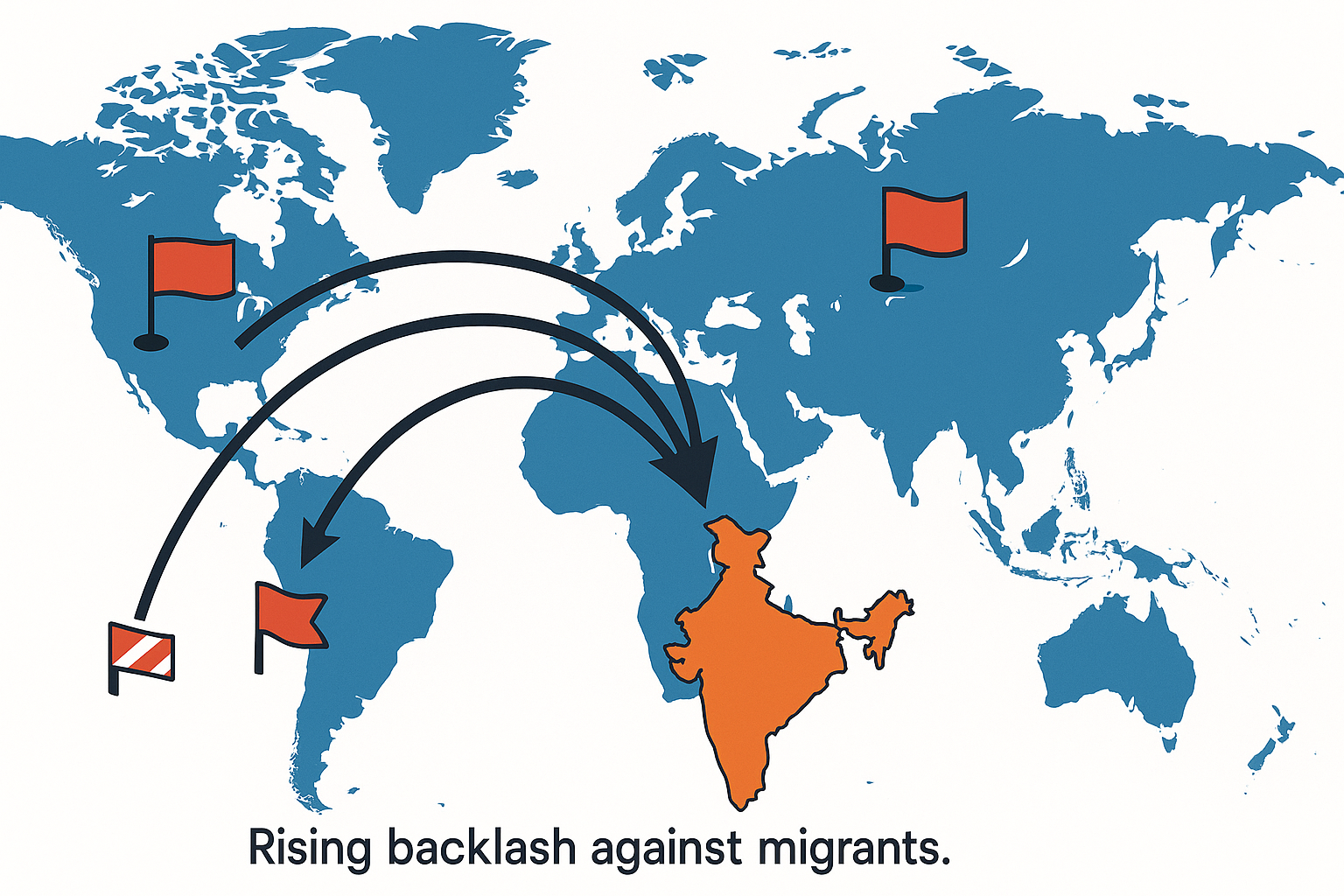Behind the West’s Rising Dislike of Indian Migrants
Key Arguments
1. Rising Hostility:
○ Indian migrants, once considered a prosperous, law-abiding community, are increasingly facing resentment across Europe, the US, and Australia.
○ This hostility stems from factors like cultural assertiveness, political visibility, and the projection of Hindutva-linked identity abroad.
2. Triggers of Anti-Indian Sentiment:
○ Public displays of Hindu nationalism (rallies, religious processions, and temple events) are portrayed as aggressive assertions of identity.
○ Islamophobia and anti-Muslim rhetoric, linked with certain groups of Indian origin, contribute to tensions..
3. Socio-economic Context:
○ High unemployment, corruption, and public discontent in host countries fuel xenophobia.
○ Indians are visible in professional sectors, leading to jealousy and perceptions of exclusivity.
4. Global Political Impact:
○ Western right-wing politics and migrant resentment feed into each other.
○ The “Stop Immigration” movement has gained legitimacy, with Indian migrants caught in its crossfire.
● The author, Tara Kartha, takes a cautionary and critical stance on the Indian diaspora.
● She notes that its earlier image of being hardworking and assimilative is shifting due to association with Hindu nationalist rhetoric abroad.
● This shift, along with the rise of far-right movements in the West, is provoking backlash against the community.
Possible Biases
● Overgeneralization: The article risks homogenizing the Indian diaspora, equating the entire community’s image abroad with a vocal Hindutva-oriented subset. .
● Western-centric lens: The framing largely reflects European/US anxieties without deeply exploring how Indian migrants themselves perceive or resist narratives.
● Limited acknowledgment of positives: Economic contributions, cultural diplomacy, and soft-power aspects of the Indian diaspora receive little mention.
Pros and Cons
Pros
● Raises awareness about the shifting perception of Indian migrants in Western Societies.
● Connects local migration issues to broader global trends of identity politics and populism. Provides concrete examples ( e.g.,Sweden,US, Germany) claims.
Cons
● Does not balance negative perceptions with evidence of diaspora contributions
● Risks reinforcing stereotypes of Indian migrants being overly assertive or sectarian
● Underplays structural issues like host-country xenophobia, racism, and economic stagnation as independent causes.
Policy Implications
1. For India
○ Strengthen diaspora engagement policies to protect Indians abroad .
○ Promote cultural diplomacy and soft power to counter negative perceptions.
2. For Host Countries
○ Balance immigration policies with domestic concerns of jobs and identity.
○ Avoid politicizing immigration for short-term electoral gains.
3. Structural Reforms
○ India’s Approach – Develop a long-term diaspora policy focusing on education, cultural diplomacy, and structured economic partnerships to strengthen India’s global image.
○ Host Countries’ Approach – Institutionalize migrant integration through fair labor practices, anti-discrimination laws, and community-level programs to reduce identity-based tensions.
Relevance to UPSC GS Papers
● GS Paper III (Economy):Migration, remittances, impact on host country economies.
● GS Paper II (Governance): Diaspora welfare, foreign policy implications, cultural diplomacy.
● Essay/GS Paper IV (Ethics in International Relations): Xenophobia, discrimination, balancing national interests with migrant rights
Balanced Summary and Future Perspectives
The editorial underlines that the rise of anti-Indian migrant sentiment reflects both cultural assertiveness of the diaspora and anxieties in host societies. While migrants contribute to global innovation and remittances, their growing visibility has triggered resentment abroad. The stance is cautionary, stressing the need for India to engage strategically while safeguarding its diasporae.
Future Perspective:
● India should strengthen diaspora policies and cultural diplomacy to counter negative perceptions.
● Host countries must ensure fair integration and anti-discrimination safeguards.
Structural reforms in migration governance, bilateral cooperation, and community engagement are essential to turn diaspora growth into an opportunity rather than a liability.

